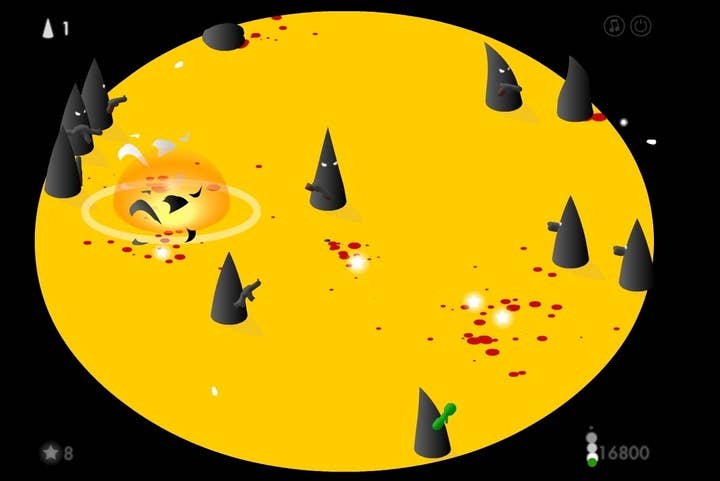Developer takes aim at gun control debate
Molleindustria's The Best Amendment designed as sarcastic tribute to the NRA's "madness"
Earlier this week, Molleindustria released its latest "radical game," The Best Amendment. After producing games about the US military's drone strikes (Unmanned) and the human cost of smartphone manufacturing (the banned-from-iTunes title Phone Story), developer Paolo Pedercini is using his latest game to consider the recent controversy over violent games in the US, and the National Rifle Association in particular.
"The Best Amendment is based on a prototype I made last year but it was only after the NRA 'more guns in schools' press conference in the aftermath of the Newtown massacre that I decided to turn it into a sort of sarcastic tribute to their madness," Pedercini told GamesIndustry International. "They released their infamous mobile game [NRA: Practice Range] right after railing against the 'shadow industry' of videogames but I was so disappointed by it... so humble, so tame, so boring. The NRA deserved something more flamboyant."
"There is substance in Call of Duty: it's the same narcotic substance that prevents people from marching in the streets to stop an absurd war that has been going on for exactly 10 years."
Paolo Pedercini
Taglined with the NRA quip, "The only thing that stops a bad guy with a gun is a good guy with a gun," The Best Amendment is set in a circular arena where a player controls a white-hooded figure and must survive a series of gun fights. However, the rival gunfighters are not controlled by AI; they are instead the player's past selves, faithfully reproducing their actions from earlier rounds. To progress, the player must kill those past selves and pick up the stars they leave behind.
While Pedercini has a reputation for making games with messages, the developer doesn't think that separates him from any other game makers out there.
"I think there is a kind of substance in all games, not only in the arthouse, political or educational ones," Pedercini said. "There is substance in Call of Duty: it's the same narcotic substance that prevents people from marching in the streets to stop an absurd war that has been going on for exactly 10 years."
But now that games have Supreme Court-approved right to free speech, Pedercini said more developers need to start using it to say something.
"I think this is a crucial aspect that is missing from the whole celebration of games as art or as 'mature' medium," he said. "Recognizing the cultural relevance of games also means recognizing that our minds, our mental models, are increasingly affected by game culture. So it's worth asking what kind of values, dreams, behaviors our games are glorifying or ignoring."
While Molleindustria has been successful in getting attention for its efforts over the last decade, it hasn't met some of the other usual criteria for developer success. For one thing, its games are usually free.
"I set up Molleindustria to be a negative profit enterprise and so far I've been very successful," Pedercini said. "There's a lot of money to be unmade in radical projects. For the second quarter I'm projecting to burn about 50 percent of my salary in unsellable products. People are always asking me for advice on how to effectively de-monetize their games but it's not an easy task: gamers love to buy games, especially when the Apple Store or Steam tell them to do so."
The Best Amendment is an exception to this, being sold on a pay-what-you-want basis. Proceeds will go to a series of workshops Pedercini is setting up titled "Imagining Better Futures Through Play." Those workshops will be part of the Allied Media Conference, a gathering of activist media makers set for this June in Detroit.

